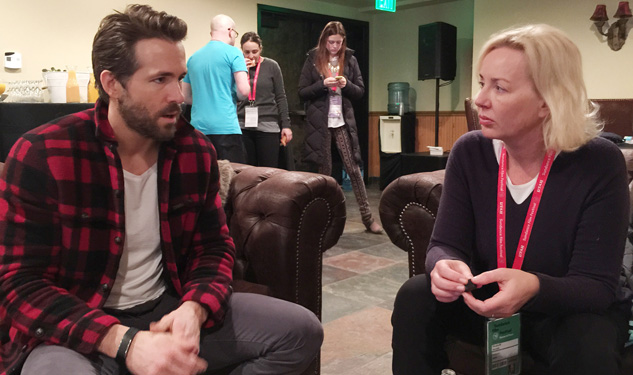
- Industry
Sundance Dailies: Ryan Reynolds, the Sundance Lumbersexual
It was an early Sunday morning for Ryan Reynolds and the members of the HFPA to sit down in the tent of one of the many festival sponsors and talk about his new film Mississippi Grind. The Canadian actor flew in from Westchester, New York, where he left wife Blake Lively and baby daughter Violet for a short trip to promote the film here. “Hey, it’s great to get a good night’s sleep! With a newborn that’s a luxury!” he jokes. He is a Sundance veteran: “The first time I was here was – I am dating myself now, – eighteen years ago, for a film called The Alarmist with my dear friend Stanley Tucci, Mary McCormack, Kate Capshaw, and I have come six times since. Last year I missed it for The Voice because I had pneumonia so I couldn’t come which I was bummed about.”
He points to the hundreds of logos around us: “A lot of people say that it’s the diversity in film that they love the most about Sundance, but for me, I love the Corporate Sponsorship. That to me is what it’s all about.“ He laughs and admits, it’s really the dress code that excites him: “No, Sundance is great, I can show up dressed like a lumbersexual and come to work, I don’t have to dress up in a tuxedo and there’s no one running to my room to put makeup on my face or anything like that and I can just roll in and do whatever I want. It’s actually just a really nice festival, the festival directors are very kind, accessible people and they have welcomed me seven times now.” In Mississippi Grind he plays Curtis, a slick gambler, who believes his own myth and
chases the dream of making the big score. He partners up with down-on-his-luck Gerry
(Ben Mendelson) on a road trip from Iowa to the South. Their destination: a high stakes poker game in New Orleans that requires a $25,000 buy-in. The film by writer-director
duo Anna Boden and Ryan Fleck invokes Robert Altman’s California Split as much as it succeeds in subtle character studies and a skillful depiction of the American South, when the two guys visit blues clubs and travel through the country: “This is my fifth or sixth film in New Orleans” says the actor, “I have been going there since before Katrina, and I guess I feel like home there. If I hadn’t been to upstate New York, I would be living in New Orleans. And my wife feels the same way, we just love it. We want to live there for at least
a couple of years too and raise kids. Most people think New Orleans is not a great place to raise kids, but it actually is, it’s fantastic and culture and the food is so healthy, the food is the best.” He laughs.
Curtis may be Reynolds’ best role to date. The richness of the character comes from the underlying sadness of a man who dreams big but never quite gets there. “He comes from a broken life obviously, we meet his mom and we see that he never really had her around, and he’s trying to repair something, but he doesn’t know it.” It is a theme that resonates personally with Reynolds: “I had trouble in my early 20s and, like a lot of people do, I had been in this business since I was a kid really, and coming to LA and being in that spotlight and being a part of that mechanism is dangerous and scary. And a lot of the things that I did when I acted out were before camera phones and tabloid journalism became a billion dollar industry. And I learned a lot then, and I also got myself some help. I don’t mean in a form of rehab or anything like that, I really took some time to go ‘who am I, what do I want and what’s happening to me right now?’. So I spent a couple of years with a therapist and I was lucky I could afford that luxury, a therapist, but I read every book on the planet, everything from self help books to spiritualization books and that kind of got me centered.”
So the actor has no trouble recognizing the similarities between him and his character in Mississippi: “Empathy is the biggest thing, that’s what got me through life anytime.
To others and myself. I found that anytime I find somebody that is annoying or angry or mean, it’s important to have boundaries and stick up for whoever they are hurting or picking on, but I also just imagine them as a kid, and they were a little kid once and somebody hurt them and they internally created a domino effect. And a lot of that is in Curtis, I think, he doesn’t preach it and neither do I, but that’s just the way he kind of is.”
Elisabeth Sereda
For more on Ryan Reynolds CLICK HERE!